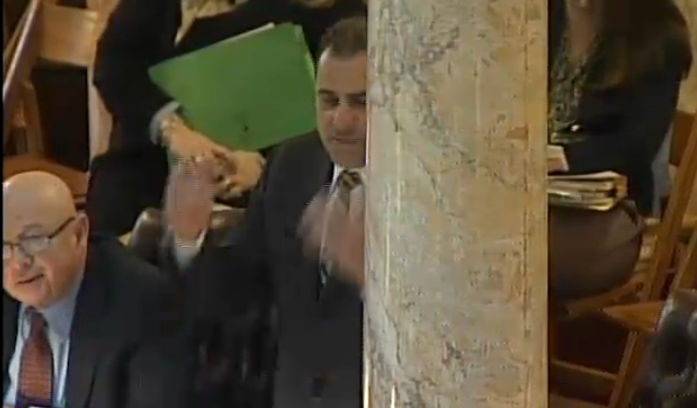Sarlo Goes off on the Process as Senate Passes Bill Revising Underage Pot Penalities

Paving the way for pot legalization in New Jersey once the bill and other enabling measures land on Governor Phil Murphy's desk, the state Senate this morning passed A-5342, which would revise the consequences associated with the underage possession or consumption of illegal marijuana or hashish, or legalized cannabis items which may only be lawfully possessed by persons 21 years of age or older.
A redo after the governor rejected an initial bill, the legislation sparked some debate on the floor, with Republicans expressing exasperation and Democrats (mostly) trying to move on. Senator Fred Madden (D-4) - a cop by trade - joined the GOP with a no vote.
An ultimately compliant state Senator Paul Sarlo (D-36) said he hated the bill.
The bill passed 22-12.
At the very least, the issue revealed a statehouse malaise and some depth of self analysis and self-loathing, as lawmakers limped to the finish line with their much-juggled version of marijuana legalization.
[caption id="attachment_4497" align="alignleft" width="300"] Scutari[/caption]
Scutari[/caption]
"Hopefully, we'll be able to pot this topic behind us... [and] comply with what the voters want us to do, which is legalizing marijuana," said state Senator Nick Scutari (D-22), co-prime sponsor of the bill in the senate, referring to a ballot question that passed last year with 67% of the vote.
"No one's happy... Let's not let the perfect be the enemy of the good," Scutari added of the so-called clean-up bill. "There's no doubt we'll back [amending the bill]."
Senator Bob Singer (R-30) vociferously objected to the bill, arguing that it weakens police and police procedures, not to mention
[caption id="attachment_97317" align="alignright" width="300"] Senator Singer[/caption]
Senator Singer[/caption]
society in general with a minimization of individual responsibility.
"It nullifies home rule," said Singer. "This bill says if there is no smoking or drinking... and someone says 'wait a minute, what's going on here?' They call and the police comes over. What can the police do? There is no consequence.
"This is absolutely ludicrous," he added. "The message this bill sends is there is no consequence to your actions."
Singer noted that he voted for medical marijuana and decriminalization. He just doesn't back this bill.
An angry state Senator Sarlo criticized the legislature.
"Today is anything but momentous. Unfortunately, all of us, we bungled this process. It's taken us three months and today we're being asked to consider a clean-up bill. I asked for commonsense protections - folks who work on dangerous construction sites, and quite frankly, my amendments were pushed aside.
"In the coming months, we will have to deal with employee and employer protections," he added. "This process has been a debacle. This has been a stark reminder to all of us."
He voted for it to move it along, but said he had already undertaken legislation he foresees as inevitable to clean up the mess it will spawn in practice.
According to the language of S-3453:
"The bill would make the underage possession of marijuana, hashish, or a cannabis item a civil penalty of $50 for persons who are between 18 and 20 years of age, if the amount possessed is what a person of legal age could lawfully possess (determined based on the lawful possession of one ounce (28.35 grams) or less of useable cannabis, the equivalent amount in a cannabis product in solid, liquid, or concentrate form, or 5 grams or less of cannabis resin, per section 46 of the Second Reprint of Assembly Bill No. 21). For the underage possession of more than what a person of legal age could lawfully possess, or any consumption of marijuana, hashish, or cannabis item, the civil penalty for persons who are between 18 and 20 years of age would be set at $100.
"The civil penalty would be recovered in a summary proceeding in the name of the municipality pursuant to the 'Penalty Enforcement Law of 1999,' P.L.1999, c.274 (C.2A:58-10 et seq.). Both the municipal court with territorial jurisdiction over an underage possession violation and the Superior Court would have jurisdiction of proceedings for the enforcement of a civil penalty."
The vote followed an introduction and vote on amendments.
Senator Ronald L. Rice (D-28) tried to introduce some 11th hour changes in the area of qualified immunity. "They did not vote for a law enforcement officer to continue to abuse our children underage, particularly children of color," the Newark-based senator in reference to those voting in favor of the 2020 ballot measure.
Senate Majority Leader Loretta Weinberg (D-37) led a vote to table Rice's amendments, setting up the subsequent vote on the bill.





